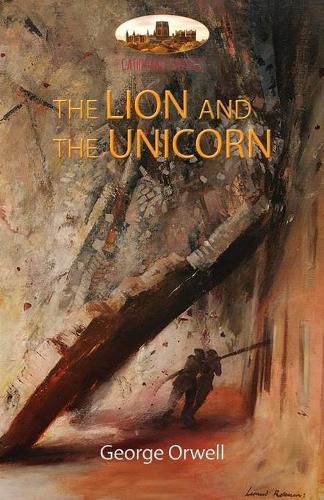Readings Newsletter
Become a Readings Member to make your shopping experience even easier.
Sign in or sign up for free!
You’re not far away from qualifying for FREE standard shipping within Australia
You’ve qualified for FREE standard shipping within Australia
The cart is loading…






This title is printed to order. This book may have been self-published. If so, we cannot guarantee the quality of the content. In the main most books will have gone through the editing process however some may not. We therefore suggest that you be aware of this before ordering this book. If in doubt check either the author or publisher’s details as we are unable to accept any returns unless they are faulty. Please contact us if you have any questions.
As a rallying cry for social revolution, Orwell’s essay, The Lion and the Unicorn, merits acclaim equal to his later allegorical novels, Animal Farmand 1984, although it never caught the public’s imagination in the quite the same way.
Eric Arthur Blair, known by his pen name as George Orwell, was born into a privileged class but developed socialist leanings and a shrewd writing style that spawned an output of essays, newspaper articles, literary criticism and novels.
Writing in the autumn of 1940 London during the early months of the blitz with bombs falling around him, Orwell makes a case for bottom-up social change in Britain, a transfer of power from the decadent ruling class to the working and middle classes. Many of his ideas in the essay - rejection of fascism, capitalism and Soviet-style communism, all of which, in his view, gave too much power to too few - came from his personal involvement in the Spanish Civil War. The British class system, says Orwell, is an anachronism that is hampering the war effort and in order to defeat Nazism there has to be a fundamental transformation towards democratic socialism to motivate the people of Britain to fight. He espouses a new equitable patriotism, founded on British traditional values and customs, a patriotism that would unite the people and release the hold of the ruling class over them, alongside a careful dismantling of the British Empire. While his prediction that revolution in England was a sine qua non for victory, proved wrong, he was exactly right in recognising the working class’s expectation of a better deal after the war.
Orwell’s vignettes of Englishness are a delight and his list of policies for a socialist democracy worthy of debate.
$9.00 standard shipping within Australia
FREE standard shipping within Australia for orders over $100.00
Express & International shipping calculated at checkout
This title is printed to order. This book may have been self-published. If so, we cannot guarantee the quality of the content. In the main most books will have gone through the editing process however some may not. We therefore suggest that you be aware of this before ordering this book. If in doubt check either the author or publisher’s details as we are unable to accept any returns unless they are faulty. Please contact us if you have any questions.
As a rallying cry for social revolution, Orwell’s essay, The Lion and the Unicorn, merits acclaim equal to his later allegorical novels, Animal Farmand 1984, although it never caught the public’s imagination in the quite the same way.
Eric Arthur Blair, known by his pen name as George Orwell, was born into a privileged class but developed socialist leanings and a shrewd writing style that spawned an output of essays, newspaper articles, literary criticism and novels.
Writing in the autumn of 1940 London during the early months of the blitz with bombs falling around him, Orwell makes a case for bottom-up social change in Britain, a transfer of power from the decadent ruling class to the working and middle classes. Many of his ideas in the essay - rejection of fascism, capitalism and Soviet-style communism, all of which, in his view, gave too much power to too few - came from his personal involvement in the Spanish Civil War. The British class system, says Orwell, is an anachronism that is hampering the war effort and in order to defeat Nazism there has to be a fundamental transformation towards democratic socialism to motivate the people of Britain to fight. He espouses a new equitable patriotism, founded on British traditional values and customs, a patriotism that would unite the people and release the hold of the ruling class over them, alongside a careful dismantling of the British Empire. While his prediction that revolution in England was a sine qua non for victory, proved wrong, he was exactly right in recognising the working class’s expectation of a better deal after the war.
Orwell’s vignettes of Englishness are a delight and his list of policies for a socialist democracy worthy of debate.